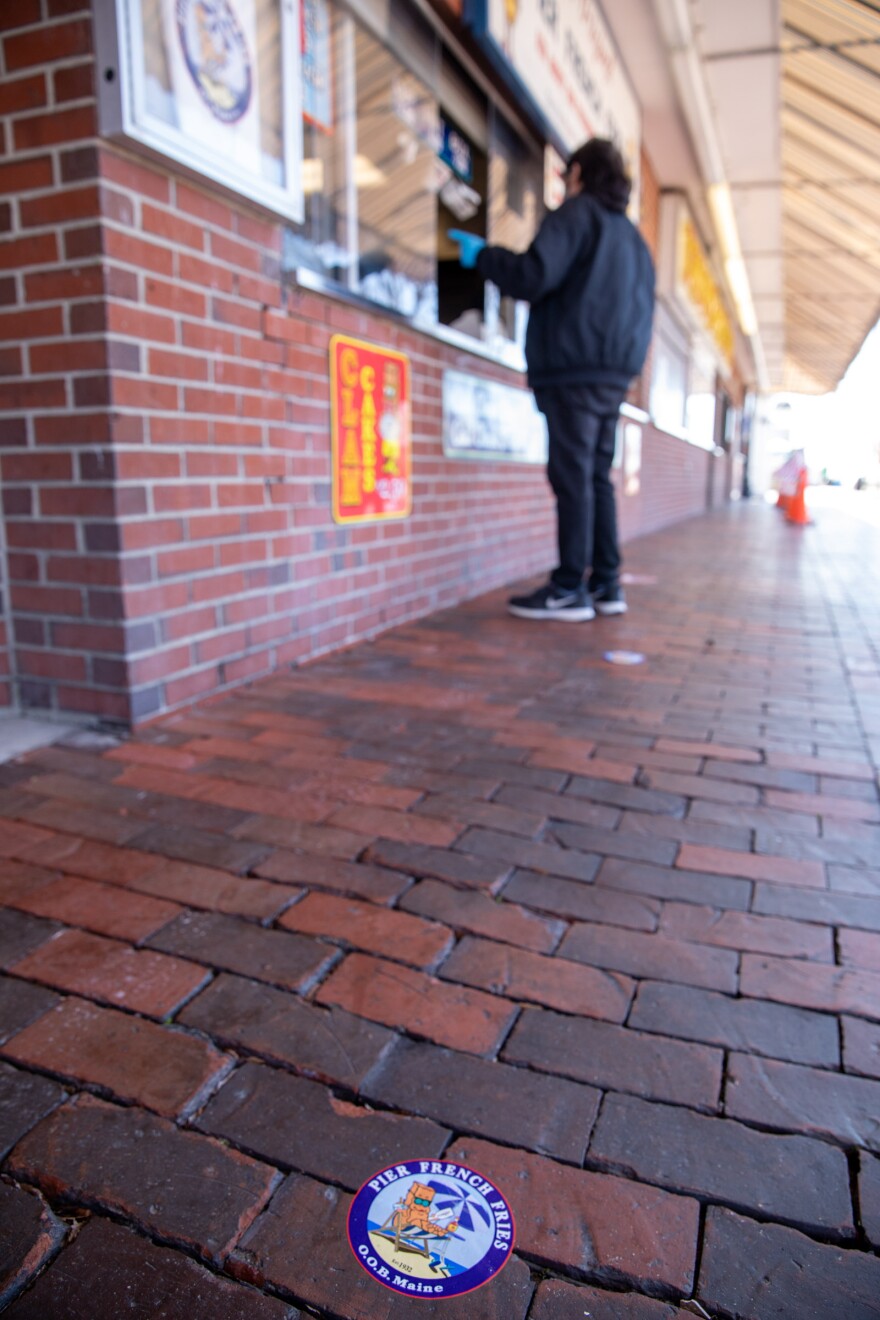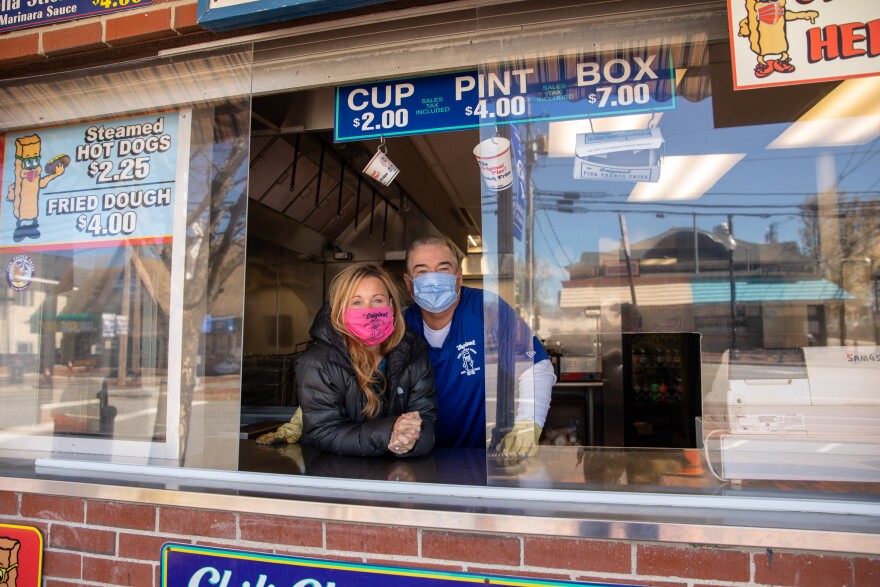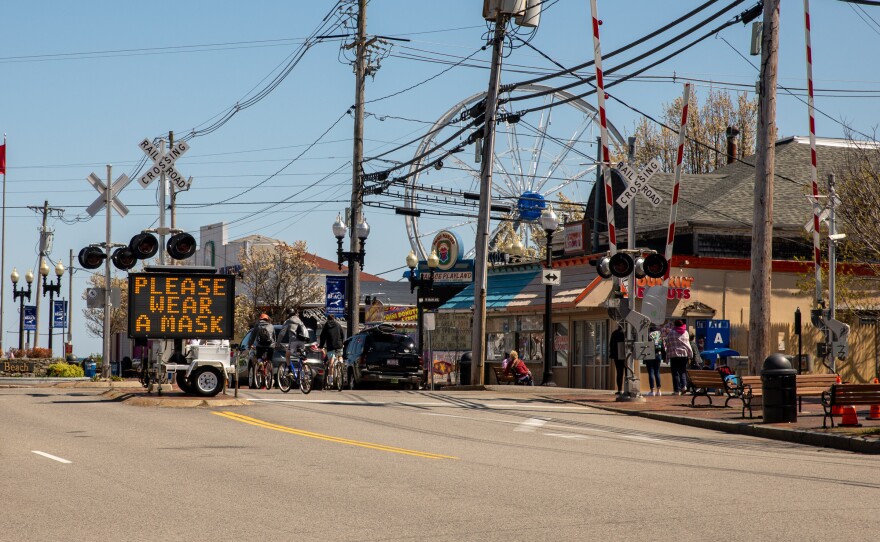The state of Maine has seen one of the country's lowest rates of hospitalization and mortality from COVID-19, but its economy relies heavily on summer visitors — many from states where the virus is still rampant.

In Old Orchard Beach, where tourism is king, it is spruce-up time for the fry shacks and pizza parlors, the rollercoasters and the tilt-a-whirl and for the town’s string of low-rise hotels.
At the Waves Oceanfront resort, workers like Raksmey Yi and owner Ken Lafayette also have something else to worry about: the novel coronavirus.
“So we’re keeping some of the pools closed, we’re not opening all of our pools,” Lafayette says.

“Yeah but the pools are the safest thing. I mean look at all those chemicals,” Yi says.
“It’s about the social distancing on the pool deck,” Lafayette says.
“We’ll just say, ‘You can’t sit on the deck, only swim, in and out,’” Yi says with a laugh.
It’s one of many new COVID-19 era concepts that Maine’s tourism leaders have to contend with.

In March, Lafayette secured a big loan for a new property, based on its long history of repeat customers from Canada. But now President Donald Trump has sealed the border indefinitely. On top of that, Gov. Janet Mills says until at least July, visitors must quarantine themselves for 14 days — in Maine — before they can stay in a local lodging.
Lafayette says he has lost bookings worth at least half a million dollars.
“So I almost feel like a failure. My brother will tell me it’s not my fault, my wife tells me it’s not my fault. But all the optics and gauges that I use, it’s just demoralizing,” he says.
And not just for him, but also the 80-plus seasonal workers he had planned for, whose job prospects are now uncertain.

At the same time, Paul Golder, the manager of the iconic Palace Playland amusement park, says he is uncertain about whether he will be able to get the staff he needs this season. That’s because he depends on dozens of young workers from Eastern Europe who usually summer here, under an exchange visa called J1.
“They’re coming from overseas, and every country in the world right now is dealing with this on their own timeline,” he says.

Golder says most of this year's planned 80-plus exchange workers at least got needed interviews done.
“But then you get to the conversation of when the borders are going to reopen. When these kids do come over, where are they going to quarantine? Can they come from whatever point of entry to Old Orchard and quarantine? Do they have to quarantine where they land?” he says.
And there is the vexing question of just how much work there will or can be, given the need to keep customers and employees safe in the park. Touchless payment technology may be deployed, Golder says, foot traffic more tightly controlled, hours more limited and there will be new strategies to provide social distance on rides that are suited to it, such as the carousel.
“We could easily mark off which horses or animals we have to keep closed and you could do that with tape, or have the operator instruct people where to sit,” he says.
And while many Old Orchard business people say they depend on the theme park to deliver downtown foot traffic — and hungry kids — Golder says the true draw that he depends on is the beach itself. And right now, the beach is partially closed, under a “walking only” order that bars sitting or sunbathing and requires social distancing.

Local officials imposed the policy last week. That drew protesters to the shore on Sunday, including local inn owner Peter Guidi.
“If you want to socially distance, socially distance. But if you want to come down and meet a girl and fall in love in Old Orchard Beach, that’s good too, because that’s the way we live around here,” he says.
Guidi says the town's fire chief and manager acted undemocratically, imposing the policy without a vote by elected officials or residents. Town Manager Larry Mead says that with the weather warming, the restriction is necessary to make sure the beach isn’t overwhelmed by visitors from areas where beaches remain closed.

He’s hopeful that by June the beach can really open up, in tandem with others on the East Coast.
“The good news is when you’re outside all reports are that the virus doesn’t transmit as readily. And the other good news is that people by and large seem to be trying to self-socially distance sort of as a matter of course. Hopefully going forward this summer, that will help out on the beach,” Guidi says.
Meantime, the town and its businesses are experimenting together on some new tactics. Last week part of the main drag was closed to allow pedestrians more room to stand in socially distanced lines at popular takeout restaurants, such as Pier Fries.

Co-owners Tiffany and Alan Buotte say the business has supported them well over the years and allowed them to take winters off. But they opened late this year and are limiting their hours and their menu.
“We’re sticking with french fries, which is our money-maker, and not selling anything else. Just to keep the line moving and make sure our customers are maintaining their social distance,” Tiffany Buotte says.
They have their workers strictly segregating duties — one to work the cash register, one to hand out the fries and condiments and one to police the line. So their payroll is actually growing.
They are confident that Pier Fries can survive. And while they are not wishing ill on any other tourism towns, they say Old Orchard might even be helped by bad news elsewhere: like cancellations of big events, such as the Yarmouth Clam Festival and Rockland's lobster festival, or the decision by nearby Saco's Funtown Splashtown amusement park not to open this summer.
"If we're able to do this properly and keep open, this is where people are going to want to come, it really comes down to not any place else to go,” says Alan. "So the revenue won't be there, but, as Tiffany said, hopefully we'll still have the winter off.”

Other business owners in Old Orchard Beach also say it could benefit from shutdowns elsewhere. One even thinks this could be the town's best summer ever.
If, that is, the state of Maine finds a way to let the tourists back in.
This story is part of our series “Deep Dive: Coronavirus.” For more in the series, visit mainepublic.org/coronavirus.
Originally published 4:29 p.m. May 20, 2020








